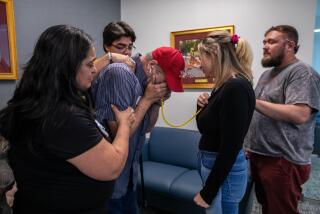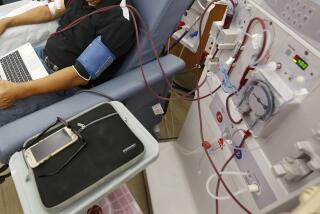U.S. transplant overseer sets guidelines
- Share via
ST. LOUIS — To allay fears that surgeons might try to retrieve the organs of dying patients prematurely, the federal contractor that oversees organ transplantation approved standards Friday to protect the growing number of donors who have no hope of recovery but who are not officially brain-dead.
The board of the United Network for Organ Sharing formalized its guidelines as authorities in San Luis Obispo County investigate whether a transplant surgeon ordered excessive doses of medication last year in an attempt to hasten the death of such a potential donor, a 26-year-old developmentally disabled man.
The county district attorney’s office, which last week received the case from police, has not decided whether to file criminal charges against the San Francisco surgeon, Dr. Hootan Roozrokh, officials said.
“Clearly nobody wants to have the instance in San Luis Obispo repeated,” said Dr. Sue V. McDiarmid, president of the United Network for Organ Sharing and a pediatric transplant physician at UCLA Medical Center. “It’s not in the interest of anybody.”
McDiarmid said the network began working on rules in 2004 to standardize practices for what is known as “donation after cardiac death” -- the type of organ retrieval at issue in San Luis Obispo. That case underscores the urgency of the work, she said.
In donation after cardiac death, donors have suffered a devastating brain injury and require ventilators to breathe but still have minimal brain function. Such retrieval has become more common in recent years as doctors have sought to expand the donor pool beyond the limited number of people who are brain-dead.
In such cases, patients are removed from life support with families’ consent. Generally, their hearts stop within minutes and they are declared dead. Their organs are then harvested. (In the San Luis Obispo case, the donor’s heart did not stop for several hours, which made his organs no longer viable for transplantation.)
Last year, there were 647 such donors nationwide, compared with 189 four years earlier. They account for about 8% of organ donors.
At a meeting in St. Louis on Friday, the United Network for Organ Sharing board said that all transplant hospitals must have policies preventing organ recovery teams from taking part in the care of a potential donor before a nontransplant doctor declares the patient dead. Members of the team are not even allowed to be in the room when life support is withdrawn, according to the standards.
Experts say the vast majority of hospitals abided by those guidelines even without the network’s formal guidance.
In the San Luis Obispo case, Roozrokh and another transplant surgeon, Dr. Arturo Martinez, were in the room, and Roozrokh ordered narcotic painkillers and sedatives for the patient, Ruben Navarro, according to a report by federal regulators. Both worked at Kaiser Permanente’s now defunct kidney transplant center in San Francisco but were retrieving the organs on behalf of a regional organ procurement group, not Kaiser.
Roozrokh’s attorney has said his client did nothing wrong and did not hasten Navarro’s death.
The network board has found fault with the handling of the incident and wants to avoid a recurrence, officials said.
The network is under pressure from lawmakers to improve its oversight of transplantation, and an influential senator is asking whether the group is doing enough to protect patients.
“I continue to be concerned about lax oversight of the transplant system,” Sen. Charles E. Grassley (R-Iowa), ranking member of the Senate Finance Committee, said in a statement this week. “At first the focus was on risk to patients waiting for donors, and now we see we need to do more to protect donors, too.”
Removing organs from brain-damaged patients once their hearts stopped was standard practice until about four decades ago, when the medical community arrived at a means of defining brain death; that then became the standard for selecting donors.
In Southern California, 15 of 432 donors last year came from donations after cardiac death, according to OneLegacy, the regional organ procurement agency. This year, there have been nine.
Western Medical Center-Santa Ana supports donation after cardiac death as a way “to give the family an option to make something better come out of a bad situation,” said Sherri Lamon, director of the intensive care and critical care units. It has done six such procedures since 2002, one this year.
But like most other hospitals that allow such retrievals, Western Medical already had a policy to ensure transplant surgeons didn’t influence or take part in end-of-life decisions. Transplant surgeons are not allowed in the operating room with a dying patient until five minutes after the patient’s heart has stopped, Lamon said.
“We are very strict with that,” she said. “Someone is watching the clock, keeping time, standing at the door.”






